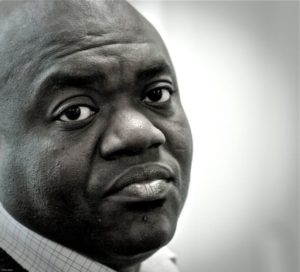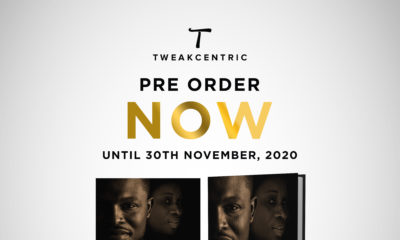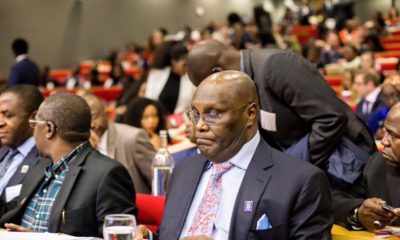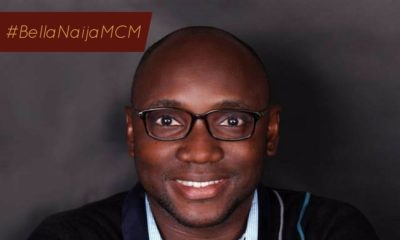Career
8 Questions for E.C. Osondu, 2009 Caine Prize Winner & Author, Voice of America

Nigerian writer and 2009 Caine Prize Winner, E.C. Osondu is well-known for his short stories, which have been published in AGNI, Guernica, Vice, Fiction, and The Atlantic. He was in Lagos and Port Harcourt last month for a series of book reading events for his debut offering, Voice of America, a collection of short stories shortlisted for the 2011 Commonwealth Prize for Best First Book (Africa region) and recently published by Kachifo Limited, publisher of Farafina Books in Nigeria. Voice of America is set in Nigeria and America. The plots move from boys and girls in villages and refugee camps to the disillusionment and confusion of young married couples living in America, and back to bustling Lagos. In this very straight-to-the-point exchange, the 2011 Pushcart Prize Winner shares with BN Editorial Assistant, Gbenga Awomodu about his new book and inspiration for writing.
When did you consciously begin to write fiction, and which writers and books had vital, early influences on your writing?
I’ll have to say I began reading fiction many, many years before I ever tried my hands at writing it. And the first thing I wrote wasn’t even fiction, it was poetry. I think I read lots of books growing up. King Solomon’s Mines, Montezuma’s Daughter, Little Women, Chike and the River, An African Nights Entertainment, etc. As you can see from the list, these were books with a strong sense of narrative. Narrative is of course central to my own writing.
Why did you leave your advertising job in Lagos to focus fully on creative writing? What factors helped you make that decision?
Even while in advertising I was still double-dipping so to speak. I was very active in the Association of Nigerian Authors and served as Vice-Chairperson of the Lagos chapter under Kunle Adebajo. I was also writing and publishing. But I think if there was one single factor it must have been the internet. I began to read the works of our own writers and many other writers online. I also began to read about creative writing programs. So you can blame the internet.
What positive habits and lessons did you bring along from writing ‘copy’ into your new endeavour?
You must grip the reader by the scruff of the neck, get their attention. Nobody is going to park their car in order to read your billboard. Even the best creative work can be killed by poor presentation. Criticism is hard to take, but learn to accept it if need be or just grin and bear it. More importantly have fun with your writing. Not necessarily in that order, though.

In the short story, Nigerians in America, the narrator’s dad suddenly turns towards her to tell her, “You have picked up enough wisdom for one night – you had better go to your bed”. How much of your childhood experiences do you infuse into your stories?
Not so much. But growing up I was always fascinated by the way people talked, their inflections, verbal tics and speech mannerisms. I recall that we gave adults nicknames based on their speech mannerisms- a favorite visitor to the house was nicknamed-You don’t mean it-because that was his stock response to every statement or question e.g. “Our daddy is not home.” – You don’t mean it, “I was first in my class” –You don’t mean it, etc.
Voice of America was a great read for me, and I never used the dictionary for once throughout the collection. Was the simple language deliberate and how were you able to achieve that?
It was deliberate. I think complex ideas can be expressed simply.
In VOA, you mostly write from a female’s point of view, whilst largely taking a swipe at the male characters. How much of a feminist is E.C. Osondu?
I am very much one. I think it makes us more deeply human. Living in the U.S. has made me more aware of the need to take the side of those that society offers limited choices either because of their race, gender, ability or disability etc.
After receiving the Caine Prize in 2009, you said Africa was yet to have a master of short stories. How close are we? How close do you think you are to becoming one?
Not there yet, but hoping and working at it nonetheless without despairing.
Where should we be hoping to see E.C. Osondu in the next five years?
I’ll continue to write. A novel and hopefully a book of creative non-fiction.
Thanks for your time!
Photo credit: Victor Ekpuk (www.untitledbooks.com); www.belindaotas.com
__________________________________________________________________________________________________
Gbenga Awomodu is an Editorial Assistant at Bainstone Ltd./BellaNaija.com. When he is not reading or writing, Gbenga is listening to good music or playing the piano. He believes in the inspirational power of words and pictures, which he explores in helping to make the world a better place. He blogs at Gbenga’s Notebook (www.gbengaawomodu.com).























